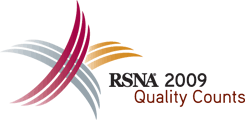
Abstract Archives of the RSNA, 2009
Ming-Kai Chen MD, PhD, Presenter: Nothing to Disclose
Mona Yasrebi MD, Abstract Co-Author: Nothing to Disclose
Jason Samii MD, Abstract Co-Author: Nothing to Disclose
Lawrence H. Staib PhD, Abstract Co-Author: Nothing to Disclose
Indukala Doddamane MBBS, Abstract Co-Author: Nothing to Disclose
David Cheng MD, PhD, Abstract Co-Author: Nothing to Disclose
There is a growing belief that a pre-therapy scan yields little or no additional information that would impact on radioiodine ablation dosing. In addition, there are some concerns with the stunning effect from pre-therapy scan especially using I-131 radioisotope. We believe the pre-therapy scan will provide invaluable information on the amount of thyroid remnant, which may require a 2-step ablation, and unsuspected local lymph node involvement, which will require a higher dose. The aim of this study is to evaluate how effective pre-therapy scans have guided our therapy planning, in addition to information provided in the pathology reports.
We have retrospectively reviewed 122 patients who underwent I-123 pre-therapy scan and I-131 radioablation at Yale-New Haven Hospital between Jan 2006 and Aug 2007. The percentage neck uptake and whole body images were acquired 24 hours following the administration of 51.8 MBq (1.4 mCi) of I-123 NaI. A 24-hour uptake of >3% was used as the cutoff to determine whether there was a greater than desired quantity of thyroid remnant requiring a 2 step treatment protocol. Furthermore, attention was paid to identify cervical lymph nodes, which may not have presented themselves in the euthyroid state at the time of thyroidectomy. Additional clinical information provided by pre-therapy scan was computed as percentage with 95% confidence intervals using adjusted Wald intervals.
Overall, the pre-therapy scans provided additional clinical information in 25% of the cases (31/122; 95% CI: 18-34%). For surgeries outside of Yale, the pre-therapy scan provided additional information in 33% of the cases (10/30; 95% CI: 19-51%). For cases with greater than 3% uptake with midline lymph nodes, the pre-therapy scan provided additional information in 50% of the cases (8/16; 95% CI: 28–72%).
Our study demonstrated that pre-therapy scans do provide additional valuable information that has impacted on the I-131 radioiodine treatment dosing. We believe that I-123 pre-therapy uptake and scan should be performed routinely in order to prescribe the most appropriate dose for effective treatment and to prevent unnecessary radiation exposure.
Chen, M,
Yasrebi, M,
Samii, J,
Staib, L,
Doddamane, I,
Cheng, D,
Is I-123 Pretherapy Uptake and Scan Beneficial in the I-131 Radioablative Therapy for Thyroid Cancer?. Radiological Society of North America 2009 Scientific Assembly and Annual Meeting, November 29 - December 4, 2009 ,Chicago IL.
http://archive.rsna.org/2009/8005072.html

